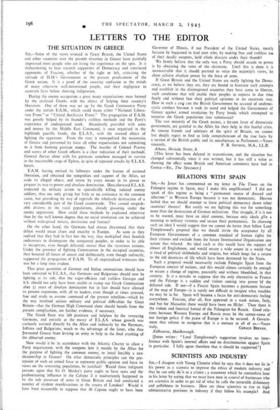RELATIONS WITH SPAIN
SIR,—As Janus has commented on my letter in The Times on the Falangist regime in Spain, may I make this amplification? I did not speak of this regime as being a "permanent source of discord and infection" in Western Europe because it was not democratic. Heaven forbid that we should attempt to force political democracy down other countries' throats! But surely we are fighting this war for something more than the destruction of German militarism. Our struggle, if it is not to be wasted, must have an ideal content, because only ideals Om a meaning to military victories and secure their permanence. In choosing such an ideal I would suggest that we cannot do better than follow Lord Templewood's proposal that we should invite the acceptance by all. European Governments of a common standard of human rights for their citizens and exclude from the future International Organisation any nation that refused. An ideal such as this would have the support of almost all Englishmen, and would secure a wide assent in a world that is tired of political shibboleths and utopias, but which longs for a return to the old decencies of life which have been destroyed by the Nazis.
Such a proposal would necessarily exclude Falangist Spain from the European concert bf nations, and this would almost certainly be enough to secure a change of regime, peaceably and without bloodshed, in that country. It is a mistake to suppose that the only alternative to Franco and the Falange is a sudden and violent coming into power 'of the defeated side. If not—if a Fascist Spain becomes a permanent feature of the map of Europe—it is surely not difficult to imagine what troubles we may be in for. Spain will become a focus for anti-democratic feeling everywhere. Fascism, after all, first appeared in a weak nation, Italy, and but for Mussolini there would have been no Hitler: Then there is the violent and fanatical hatred of the Falangists for Russia. Gooa rela- tions between Western Europe and Russia must be the corner-stone of our foreign policy if the peace of Europe is to be secured. A Govern- ment that refuses to recognise that is a menace to all of us.—Yours
[Janus writes: "Lord Templewood's suggestion involves no inter- ference with Spain's internal affairs and no discrimination against Spain in particular. I fully agree therefore that it should be supported.")


























 Previous page
Previous page